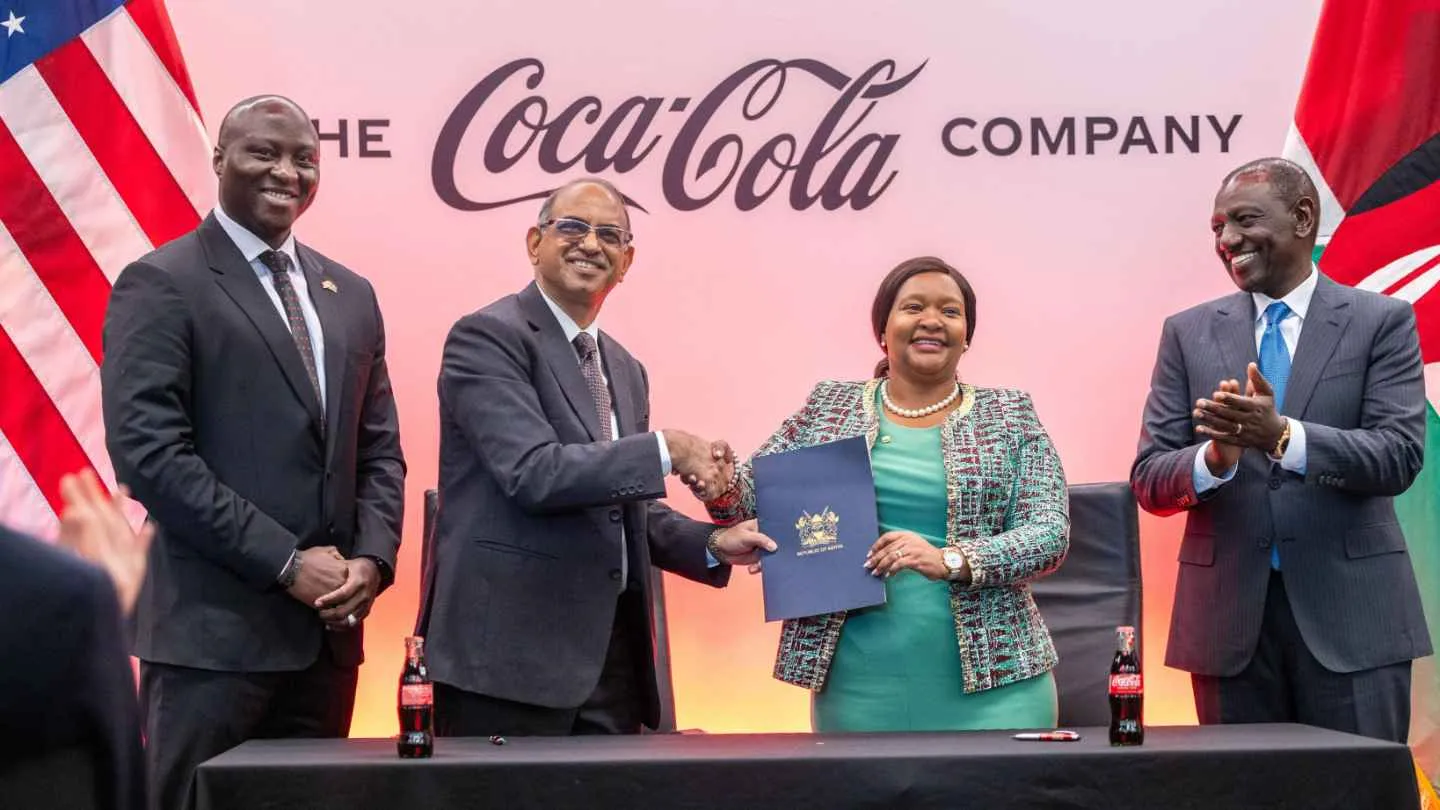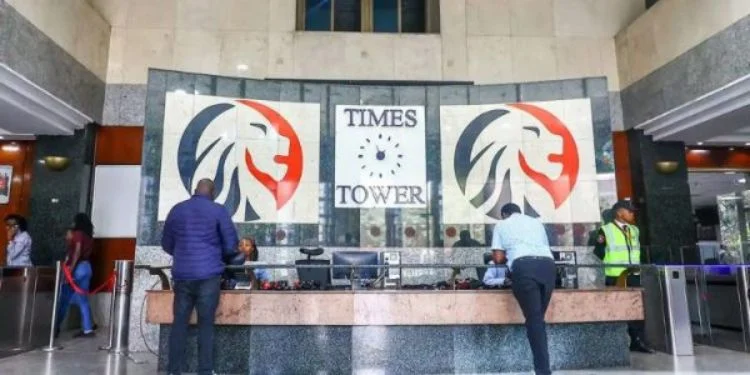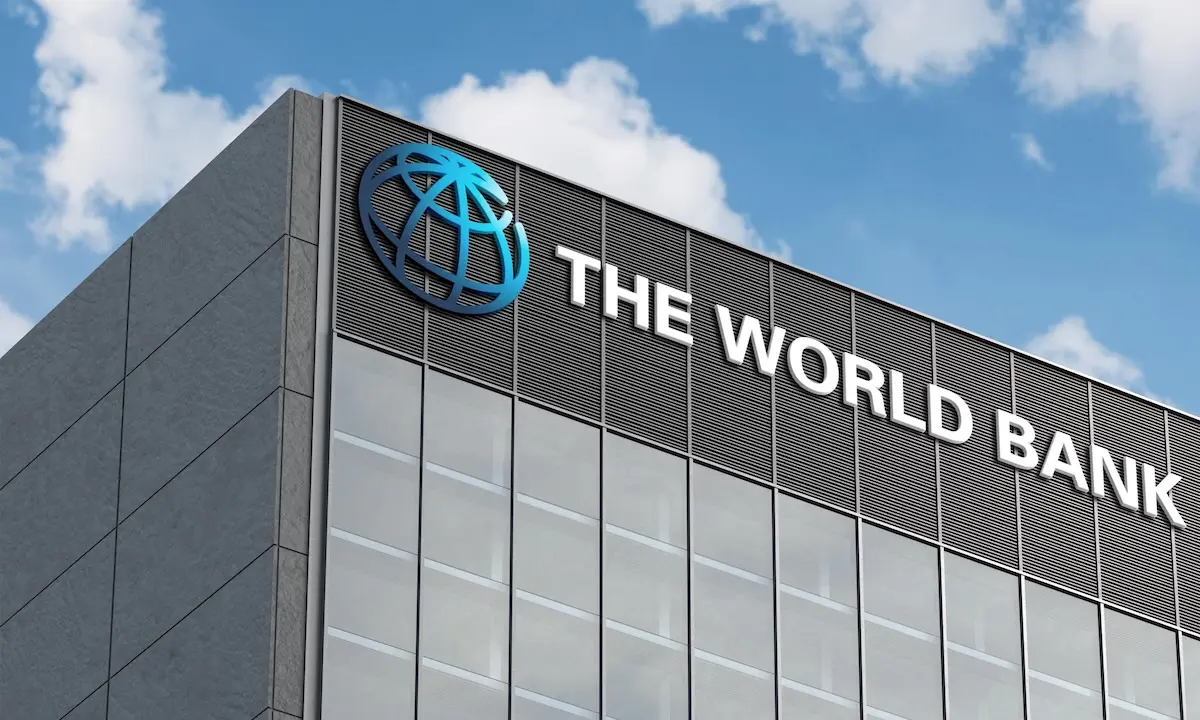Kenya is set to receive a transformative $1.65 million investment from the Coca-Cola system to restore critical watersheds and enhance water security across the nation. The announcement comes as Kenya grapples with what experts describe as the worst drought in 40 years, affecting millions of people and exacerbating a water crisis that has persisted for decades.
The investment will target the Upper-Tana and Mid-Galana basins, key catchment areas that feed Nairobi’s primary reservoirs and the vital Mzima Springs aquifer. This strategic focus addresses water security challenges affecting not only Kenya’s capital city but also surrounding communities that depend on these critical water sources for their survival and economic activities.
Push boundaries, reach goals, achieve more. Whether it’s ACCA, HESI A2, ATI TEAS 7, HESI EXIT, NCLEX-RN, NCLEX-PN, or Financial Literacy, we’ve got the Online course to match your ambition. Start with Serrari Ed now.
Addressing Kenya’s Escalating Water Crisis
Kenya’s water challenges have reached unprecedented levels, with recent reports indicating that the country is experiencing its most severe water crisis in four decades. The situation has been exacerbated by five consecutive below-average rainy seasons, creating the longest and most severe drought in recent history.
According to the United Nations, approximately 6.4 million people required humanitarian assistance in 2023, representing a 35% increase compared to 2022. This marks the highest number of people in need recorded in Kenya in at least the last decade. The drought has taken a devastating toll on communities’ access to water, with almost 95% of water pans drying up in 2022.
The crisis extends beyond immediate water access challenges. In many areas, people are now forced to trek between 8.6 and 17.6 kilometers to access water sources – at least 38% above the three-year average according to the National Drought Management Authority. This places an enormous burden on women and girls, who traditionally bear responsibility for water collection, exposing them to heightened risks of gender-based violence during extended journeys.
Comprehensive Watershed Restoration Strategy
The Coca-Cola investment encompasses a multi-faceted approach to watershed restoration and water security enhancement. Planned activities include the introduction of agroforestry systems, rainwater harvesting initiatives to support groundwater recharge, and large-scale tree planting along riparian zones to restore ecosystems and improve water quality.
The project will be implemented through strategic partnerships with The Nature Conservancy (TNC) and community-based organizations, ensuring local engagement and sustainable implementation. Key components include:
Ecosystem Restoration: The initiative will plant thousands of indigenous trees along riparian zones to enhance water quality and prevent soil erosion. This natural infrastructure approach helps restore the ecological balance necessary for sustainable water management.
Sustainable Land Management: The project focuses on rehabilitating degraded farms and rangelands, creating hundreds of farm ponds, and establishing fruit orchards that both strengthen food security and provide alternative sources of income for local households.
Community Empowerment: Working with grassroots partners including the Upper Tana-Nairobi Water Fund Trust, Green Generation Initiative, and Jumuiya Water Fund, the initiative emphasizes community ownership and long-term sustainability.
Part of Broader African Water Stewardship Initiative
This Kenya-specific investment represents a component of the Coca-Cola system’s Africa Water Stewardship Initiative, a comprehensive program launched in 2024 with an overall commitment of nearly $25 million. The continental program aims to address water scarcity and resilience challenges across 20 African countries by 2030, recognizing that water insecurity affects one in three Africans.
The broader initiative will be led by the Global Water Challenge (GWC) and implemented by a consortium of international partners, including The Nature Conservancy, the International Union for Conservation of Nature (IUCN), and the World Wildlife Fund (WWF). This collaborative approach leverages diverse expertise and resources to maximize impact across multiple African nations.
Alfred Olajide, Vice President of Franchise Operations for East and Central Africa at Coca-Cola, emphasized the urgency of addressing water insecurity: “As we face increasing water insecurity worldwide, with demand surpassing supply in many regions including Africa, Coca-Cola is actively working to help accelerate efforts to address water stress, protect local water resources, and build community climate resilience.”
Climate Change Impact on Kenya’s Water Resources
Kenya’s water crisis reflects broader climate change impacts affecting the East African region. Historical data shows that rainfall patterns have become increasingly erratic and unpredictable, disrupting traditional seasonal cycles that communities and farmers have relied upon for generations.
Cornelius Kyalo, Executive Director of The Water Project’s Southeast Kenya Program, describes the dramatic shift: “30-40 years ago, the rainfall and dry seasons used to start and end at the right time. As a result of climate change and variability, the frequency of famines/drought cycles in the area has increased from 20 years, to 12 years, to two years, and currently almost to an annual phenomenon.”
The World Bank Climate Risk Country Profile for Kenya confirms these observations, noting that “extreme rainfall events are occurring with greater frequency and intensity. Increased aridity and droughts have also been observed, with moderate drought events recorded on average every three to four years and major droughts every ten years.”
Build the future you deserve. Get started with our top-tier Online courses: ACCA, HESI A2, ATI TEAS 7, HESI EXIT, NCLEX-RN, NCLEX-PN, and Financial Literacy. Let Serrari Ed guide your path to success. Enroll today.
Economic and Social Implications
The water crisis carries profound economic and social implications for Kenya’s development trajectory. Water scarcity affects multiple sectors including agriculture, industry, health, and education, creating a cascade of challenges that perpetuate poverty and limit economic growth opportunities.
In rural areas and urban slums, where people are often unable to connect to piped water infrastructure, families spend up to one-third of their day fetching water. This burden disproportionately affects women and children, limiting educational opportunities and economic participation. The health implications are equally severe, with unsafe water sources contributing to waterborne diseases and infant mortality.
The agricultural sector, which employs a significant portion of Kenya’s population, faces particular challenges. Drought conditions harden soil, preventing rain from soaking in when it finally arrives. Instead of replenishing crops, the limited water runs off, leaving farmland as dry as before. This creates cycles of food insecurity and economic hardship that affect millions of people.
Corporate Water Stewardship Leadership
The Coca-Cola initiative exemplifies growing corporate water stewardship efforts across Africa, where multinational companies are increasingly recognizing their role in addressing water security challenges. James Bowmaker, General Manager of Coca-Cola Beverages Kenya (CCBK), emphasized this responsibility: “CCBK, as part of CCBA, has a responsibility to assist those who face water scarcity and to help protect local water resources where we operate, especially in places with the biggest challenges.”
Coca-Cola Beverages Africa (CCBA), the largest Coca-Cola bottler in Africa and eighth largest globally by revenue, accounts for more than 40% of Coca-Cola’s ready-to-drink beverages sold on the continent. The company’s significant presence and operational footprint position it to make meaningful contributions to water security across multiple African markets.
The initiative builds upon previous successful programs, including similar water projects in South Africa, Ethiopia, and Mozambique. In South Africa, CCBA has implemented the innovative “Coke Ville” program, an off-grid, solar-powered groundwater harvesting and treatment initiative that provides potable water to water-stressed communities at no cost.
Regional Water Investment Trends
Kenya’s water challenges reflect broader regional patterns that are attracting increased attention from international development organizations and private sector investors. The African Development Bank has placed water security and climate resilience at the center of its Ten-Year Strategy (2024-2033), investing approximately $2.8 billion annually to build resilience across the continent.
The upcoming African Union-AIP Water Investment Summit 2025 highlights the continental scale of water investment needs. The summit aims to mobilize an additional $30 billion per year towards climate-resilient water and sanitation infrastructure across Africa.
These large-scale investment initiatives recognize that achieving UN Sustainable Development Goal 6 – ensuring water and sanitation for all – is essential for progress on all other development goals. Current data indicates that approximately 411 million people across Africa lack basic drinking water services, with Sub-Saharan Africa accounting for about 387 million of those affected.
Technology and Innovation Applications
The Kenya water security project incorporates innovative approaches that combine traditional water management techniques with modern technology solutions. The agroforestry systems being implemented represent a nature-based solution that provides multiple benefits including soil conservation, carbon sequestration, and improved water infiltration.
Rainwater harvesting initiatives focus on maximizing capture and storage of limited precipitation, while groundwater recharge activities help replenish underground aquifers that serve as critical backup water sources during drought periods. These techniques are particularly valuable in semi-arid regions where surface water sources are unreliable.
The partnership approach ensures that technological solutions are culturally appropriate and sustainable within local contexts. Community-based organizations provide essential local knowledge and ensure that interventions align with traditional water management practices while introducing beneficial innovations.
Long-term Sustainability and Impact Measurement
The Coca-Cola initiative emphasizes long-term sustainability through comprehensive community engagement and capacity building. Ruth Masha, Kenya Country Director at TNC, highlighted this approach: “We are collaborating with local communities and our grassroots partners as we work towards a sustainable future for people and nature in Africa.”
Impact measurement will focus on multiple indicators including:
- Water availability: Tracking improvements in water access and reliability for targeted communities
- Ecosystem health: Monitoring watershed restoration progress and biodiversity recovery
- Community resilience: Assessing enhanced capacity to manage water resources and adapt to climate variability
- Economic benefits: Evaluating improvements in agricultural productivity and alternative livelihood opportunities
The five to ten-year timeframe for the initiative allows for comprehensive ecosystem restoration while providing sufficient time to build local capacity for ongoing management and maintenance.
Government and Policy Context
Kenya’s government has implemented various policies and frameworks to address water security challenges, though implementation gaps persist. The National Water Master Plan, launched in 1974 with the goal of providing accessible water within walking distance of every household by 2000, remains largely unfulfilled due to funding constraints and institutional challenges.
Recent government initiatives have focused on improving water governance and infrastructure development, while regulatory frameworks continue evolving to address emerging challenges including climate change adaptation and private sector participation in water service delivery.
The public-private partnership model demonstrated by the Coca-Cola initiative offers a pathway for accelerating progress on water security goals while leveraging corporate resources and expertise alongside government efforts and international development funding.
Future Outlook and Scaling Potential
The success of Kenya’s watershed restoration initiative could serve as a model for scaling similar interventions across East Africa and other water-stressed regions globally. The comprehensive approach combining ecosystem restoration, community engagement, and sustainable livelihood development addresses multiple challenges simultaneously.
Scaling potential exists through several mechanisms:
- Regional expansion: Applying lessons learned to similar watersheds across East Africa
- Corporate engagement: Encouraging other multinational companies to invest in water stewardship initiatives
- Government adoption: Integrating successful techniques into national water management policies and programs
- International funding: Leveraging demonstrated success to attract additional development finance for water security projects
The climate change context makes such initiatives increasingly urgent, as traditional water management approaches prove inadequate for addressing new patterns of variability and extreme weather events. Nature-based solutions like those being implemented in Kenya offer resilience benefits that extend beyond immediate water security to include climate adaptation and biodiversity conservation.
As Kenya moves forward with this transformative water security investment, the initiative represents both a response to immediate crisis and a foundation for long-term resilience in the face of ongoing climate challenges. The success of this public-private partnership approach could influence water security strategies across Africa and beyond, demonstrating the potential for corporate leadership in addressing critical development challenges.
Ready to take your career to the next level? Join our Online courses: ACCA, HESI A2, ATI TEAS 7 , HESI EXIT , NCLEX – RN and NCLEX – PN, Financial Literacy!🌟 Dive into a world of opportunities and empower yourself for success. Explore more at Serrari Ed and start your exciting journey today! ✨
Track GDP, Inflation and Central Bank rates for top African markets with Serrari’s comparator tool.
See today’s Treasury bonds and Money market funds movement across financial service providers in Kenya, using Serrari’s comparator tools.
photo source: Google
By: Montel Kamau
Serrari Financial Analyst
17th September, 2025
Article, Financial and News Disclaimer
The Value of a Financial Advisor
While this article offers valuable insights, it is essential to recognize that personal finance can be highly complex and unique to each individual. A financial advisor provides professional expertise and personalized guidance to help you make well-informed decisions tailored to your specific circumstances and goals.
Beyond offering knowledge, a financial advisor serves as a trusted partner to help you stay disciplined, avoid common pitfalls, and remain focused on your long-term objectives. Their perspective and experience can complement your own efforts, enhancing your financial well-being and ensuring a more confident approach to managing your finances.
Disclaimer: This article is for informational purposes only and does not constitute financial advice. Readers are encouraged to consult a licensed financial advisor to obtain guidance specific to their financial situation.
Article and News Disclaimer
The information provided on www.serrarigroup.com is for general informational purposes only. While we strive to keep the information up to date and accurate, we make no representations or warranties of any kind, express or implied, about the completeness, accuracy, reliability, suitability, or availability with respect to the website or the information, products, services, or related graphics contained on the website for any purpose. Any reliance you place on such information is therefore strictly at your own risk.
www.serrarigroup.com is not responsible for any errors or omissions, or for the results obtained from the use of this information. All information on the website is provided on an as-is basis, with no guarantee of completeness, accuracy, timeliness, or of the results obtained from the use of this information, and without warranty of any kind, express or implied, including but not limited to warranties of performance, merchantability, and fitness for a particular purpose.
In no event will www.serrarigroup.com be liable to you or anyone else for any decision made or action taken in reliance on the information provided on the website or for any consequential, special, or similar damages, even if advised of the possibility of such damages.
The articles, news, and information presented on www.serrarigroup.com reflect the opinions of the respective authors and contributors and do not necessarily represent the views of the website or its management. Any views or opinions expressed are solely those of the individual authors and do not represent the website's views or opinions as a whole.
The content on www.serrarigroup.com may include links to external websites, which are provided for convenience and informational purposes only. We have no control over the nature, content, and availability of those sites. The inclusion of any links does not necessarily imply a recommendation or endorsement of the views expressed within them.
Every effort is made to keep the website up and running smoothly. However, www.serrarigroup.com takes no responsibility for, and will not be liable for, the website being temporarily unavailable due to technical issues beyond our control.
Please note that laws, regulations, and information can change rapidly, and we advise you to conduct further research and seek professional advice when necessary.
By using www.serrarigroup.com, you agree to this disclaimer and its terms. If you do not agree with this disclaimer, please do not use the website.
www.serrarigroup.com, reserves the right to update, modify, or remove any part of this disclaimer without prior notice. It is your responsibility to review this disclaimer periodically for changes.
Serrari Group 2025
















